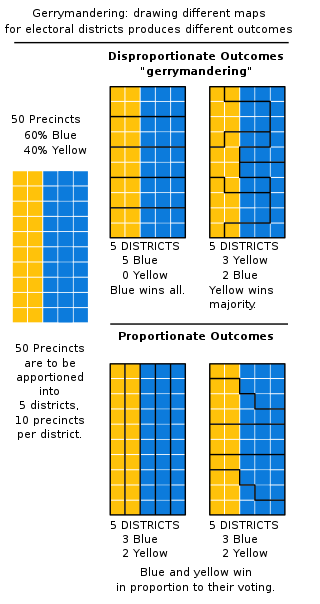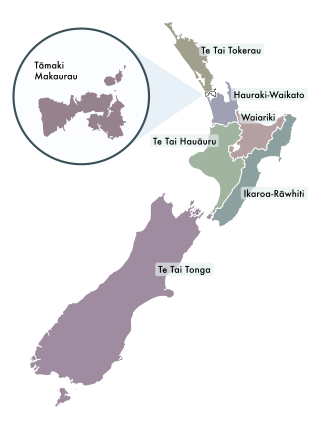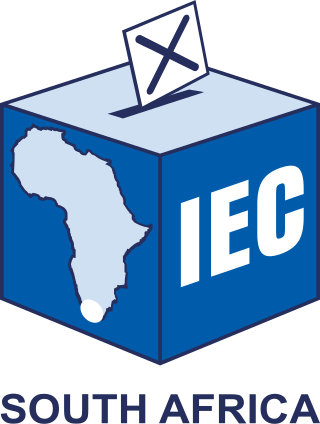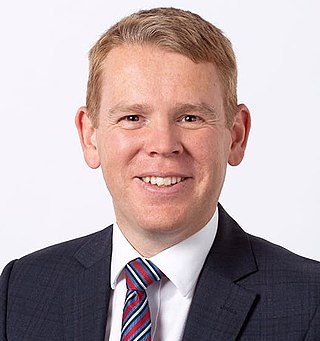Related Research Articles

In representative democracies, gerrymandering is the political manipulation of electoral district boundaries with the intent to create undue advantage for a party, group, or socioeconomic class within the constituency. The manipulation may involve "cracking" or "packing". Gerrymandering can also be used to protect incumbents. Wayne Dawkins describes it as politicians picking their voters instead of voters picking their politicians.
Proportional representation (PR) refers to a type of electoral system under which subgroups of an electorate are reflected proportionately in the elected body. The concept applies mainly to political divisions among voters. The essence of such systems is that all votes cast – or almost all votes cast – contribute to the result and are effectively used to help elect someone – not just a bare plurality, or (exclusively) the majority – and that the system produces mixed, balanced representation reflecting how votes are cast.

The Senate is the upper house of the bicameral Parliament of Australia, the lower house being the House of Representatives. The composition and powers of the Senate are established in Chapter I of the Constitution of Australia. There are a total of 76 senators: 12 are elected from each of the six Australian states regardless of population and 2 from each of the two autonomous internal Australian territories. Senators are popularly elected under the single transferable vote system of proportional representation.
Compulsory voting, also called universal civic duty voting or mandatory voting, is the requirement that registered voters participate in an election. In practice, one only needs to check-in at a polling place, submit a blank ballot, or provide an excused reason, such as disability, illness, age, travel, a natural disaster, or religious objections.

Electoral reform in New Zealand has, in recent years, become a political issue as major changes have been made to both parliamentary and local government electoral systems.

New Zealand is a representative democracy in which members of the unicameral New Zealand Parliament gain their seats through elections. General elections are usually held every three years; they may be held at an earlier date at the discretion of the prime minister, although it usually only happens in the event of a vote of no confidence or other exceptional circumstances. A by-election is held to fill an electorate vacancy arising during a parliamentary term. The most recent general election took place on 17 October 2020.

The Australian Electoral Commission (AEC) is the independent federal agency in charge of organising, conducting and supervising federal Australian elections, by-elections and referendums.

In New Zealand politics, Māori electorates, colloquially known as the Māori seats, are a special category of electorate that give reserved positions to representatives of Māori in the New Zealand Parliament. Every area in New Zealand is covered by both a general and a Māori electorate; as of 2020, there are seven Māori electorates. Since 1967, candidates in Māori electorates have not needed to be Māori themselves, but to register as a voter in the Māori electorates people need to declare that they are of Māori descent.
An electoral roll is a compilation that lists persons who are entitled to vote for particular elections in a particular jurisdiction. The list is usually broken down by electoral districts, and is primarily prepared to assist election officials at polling places. Most jurisdictions maintain permanent electoral rolls, which are updated continuously or periodically, while some jurisdictions compile new electoral rolls before each election. Electoral rolls are the result of a process of voter registration. In most jurisdictions, voter registration is a prerequisite for voting at an election. Some jurisdictions do not require voter registration, and do not use electoral rolls, such as the state of North Dakota in the United States. In those jurisdictions a voter must provide identification and proof of entitlement to vote before being permitted to vote.

The New Zealand electoral system has been mixed-member proportional (MMP) since the 1996 election. MMP was introduced following a referendum in 1993. It replaced the first-past-the-post (FPP) system New Zealand had previously used for most of its history. New Zealanders elect their members of parliament (MPs) with two votes. The first vote is for a candidate from an electorate. The second vote is used to elect ranked party lists.

Referendums are held only occasionally by the Government of New Zealand. Referendums may be government-initiated or held in accordance with the Electoral Act 1993 or the Citizens Initiated Referenda Act 1993. Nineteen referendums have been held so far. Fourteen were government-led, and five were indicative citizen initiatives.

Auckland Central is a New Zealand electoral division returning one member to the New Zealand House of Representatives. The electorate is currently represented by Chlöe Swarbrick, a member of the Green Party; she has represented the seat since 2020.

The Court of Disputed Returns in Australia is a special jurisdiction of the High Court of Australia. The High Court, sitting as the Court of Disputed Returns, hears challenges regarding the validity of federal elections. The jurisdiction is twofold: (1) on a petition to the Court by an individual with a relevant interest or by the Australian Electoral Commission, or (2) on a reference by either house of the Commonwealth Parliament. This jurisdiction was initially established by Part XVI of the Commonwealth Electoral Act 1902 and is now contained in Part XXII of the Commonwealth Electoral Act 1918. Challenges regarding the validity of State elections are heard by the Supreme Court of that State as the State's Court of Disputed Returns.

Wellington Central is an electorate, represented by a Member of Parliament in the New Zealand House of Representatives. Its MP since November 2008 has been Labour Party's Grant Robertson. In the 2020 election he was opposed by James Shaw (Greens) and Nicola Willis (National), both also entered parliament via their respective party lists.
Preselection is the process by which a candidate is selected, usually by a political party, to contest an election for political office. It is also referred to as candidate selection. It is a fundamental function of political parties. The preselection process may involve the party's executive or leader selecting a candidate or by some contested process. In countries that adopt Westminster-style responsible government, preselection is also the first step on the path to a position in the executive. The selected candidate is commonly referred to as the party's endorsed candidate.

Taupō is a New Zealand parliamentary electorate returning one Member of Parliament to the House of Representatives. Taupo first existed between 1963 and 1981, and was recreated for the introduction of MMP in 1996. The current MP for Taupō is Louise Upston of the National Party. She has held this position since 2008.

The Electoral Commission of South Africa is South Africa's election management body, an independent organisation established under chapter nine of the Constitution. It conducts elections to the National Assembly, provincial legislatures and municipal councils.

The 1999 New Zealand MP reduction referendum was held during the 1999 general election on 27 November 1999. The Referendum considered two questions, in which one brought upon the question on whether New Zealand Parliament should be restructured - reducing the number of MPs from 120 to 99 members in the House of Representatives.

Lisa Hill is Professor of Politics at the University of Adelaide, Australia. She has previously held positions at the University of Sydney and the Australian National University.

The 2023 New Zealand general election to determine the composition of the 54th Parliament of New Zealand is planned to be held on 14 October 2023, after the currently elected 53rd Parliament is dissolved or expires. Voters will elect 120 members to the unicameral New Zealand House of Representatives under the mixed-member proportional (MMP) voting system, a proportional representation system in which 72 members will be elected from single-member electorates and 48 members from closed party lists.
References
- ↑ "Developing an EMB Voter Education Training Plan —". aceproject.org. Retrieved 14 October 2018.
- ↑ "Letter sent to Audrey Young by Helena Catt". NZ Herald. 2 April 2008. ISSN 1170-0777 . Retrieved 14 October 2018.
- ↑ "Helena Catt's research works | New Zealand Productivity Commission, Wellington and other places". ResearchGate. Retrieved 14 October 2018.
- ↑ "New Electoral Commission CEO announced". The Beehive. Retrieved 14 October 2018.
- ↑ ""We saw a carefully planned, military-style operation", Helena Catt world-renowned expert". Ara.cat (in Catalan). Retrieved 14 October 2018.